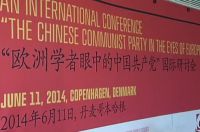
根据著名专栏作家邱林的说法,中国的不干涉内政政策是“幼稚”的且不利于维护其全球利益。他认为,一边是国际社会要求中国承担更多“责任”,另一边则是需要维护其不断增加的海外利益,中国夹在这两者之间,左右为难,甚至可能两者皆失。
本文主要关注于中国对伊朗、苏丹、叙利亚、朝鲜和缅甸的外交政策争论。即便是在反复强调保持思想一致的时刻,这些争论所体现出的不同观点仍然令人惊讶。中国研究员提到中国在伊朗和缅甸等国高调建立商业据点的危险性。他们认识到了公众对新当选总统哈桑·鲁哈尼的支持,以及背后的原因—对改革的渴望。邓聿文,一个极具争议的民主党派知识分子,甚至认为中朝间的意识形态鸿沟大于中国和西方。严酷的现实是与中国关系密切的伙伴如何看待中国,例如,一些分析家害怕,朝鲜有一天会轻易地与中国解除同盟关系,而转投美国怀抱。
然而,批评和质疑声往往走向另一个极端。中国试图在中东与每个国家保持友好关系,然而现在这种平衡策略已被视为徒劳无益。相反,由于美国被视为热衷于攻打伊朗、忽视任何公开交流,中国不得已实施“抗美援伊”的政策。这个口号套用了朝鲜战争爆发后毛泽东在国内的一次最艰巨的动员:伊朗被视为今天的中国,而叙利亚就是伊朗的朝鲜;他们都认为自己势必获得中国的全力支持。
当今中国最为著名的战略专家之一,阎学通,表达了不同甚者是相反的意见。他认为中国应该在联合国与俄罗斯保持立场一致,而让西方自己从泥潭中解脱。通过实行否决权,并且继续坚持不干涉他国内政政策,中国才会真正提高其国际地位。
此番言论是在奥巴马政府重返叙利亚前提出,阎学通似乎有先见之明。但是他也有自相矛盾之处。其实,阎学通也是率先批评不干涉政策、建议中国建立同盟的人。
经济安全和能源资源很显然在中国制定外交政策中发挥着主要作用。即使美国专家认识到美国实际上一直在默许中国获取石油,也难以摆脱未来可能来自中国的讹诈。我们研究中国的研究员对南北苏丹持有一种超然的看法:两个苏丹因为冲突和能源相互依赖而绑在一起,而因为对南苏丹的援助同时会间接帮助北苏丹,所以美国实际上正在限制援助。中国似乎认为,这不再是一个战略议题(传统意识形态上倾向于支持喀土穆)。关键是,他们预计苏丹的石油资源将会很快消耗殆尽。
悲观主义情绪笼罩着中国的研究人员。他们害怕五角大楼会推行其“睡莲叶子”战略至缅甸(一个建立在地区周边小型基地的网络)。西方并不是要围堵中国,而是通过经济制裁,成功的压制了缅甸。他们认为如果叙利亚的巴沙尔•阿萨德政权倒台后,会被一个亲西方的政权所取代。如果西方有谁做出这样的预计,都会被视为痴心妄想。
不干涉政策不利于对事件做出快速反应,还保护了僵化的思想,中国外交因此可能会受到伤害。我们的专家在广泛的不同议题上表达了相同的失望。但是,制定一个更加负责任的政策,无惧站队或对某项国内事务表态,会带来猜忌和分歧。中国似乎陷入了两难境地,要么冒险做一个甩手掌柜,要么实行帝国主义霸权。
(“第一智库”网初步翻译,仅供参考)
According to Qiu Lin, a well-known columnist, China’s non-interference policy is “naive” and unsuited to protecting its global interests. He says that, caught between international demands for China to take “responsibility” and the need to defend its growing stake in many foreign economies, China has proven hesitant in choosing either course, and may be losing on both counts.
This issue of China Analysis focuses on China’s foreign-policy debate on Iran, Sudan, Syria, North Korea and Burma. Even at a moment when ideological unity is being strongly reasserted, the range of views expressed in this debate is striking. Chinese analysts mention the dangers of China’s high-profile commercial foothold in countries like Iran and Burma. They acknowledge public support for newly-elected President Hassan Rouhani and its reasons – a yearning for reform. A controversial party intellectual, Deng Yuwen, even writes that the ideological gulf between China and North Korea is larger than that between China and the West. There is stark realism on what close partners think of China – for example, some analysts reveal the fear that they have of North Korea one day simply reversing alliances and leaning towards the United States.
However, criticism and doubts mostly go in the other direction. China’s balancing game in the Middle East, where it has strived to keep friendly relations with everyone, is now seen as ineffectual. Instead, and because America is seen as being so keen to attack Iran and to neglect any opening, China is urged to launch an “aid Iran, strike America” policy. The motto is based on one of Mao’s toughest domestic campaigns at the outbreak of the Korean War: Iran is seen as today’s China and Syria is Iran’s North Korea; both are believed to deserve China’s full support.
One of China’s currently most prominent strategy pundits, Yan Xuetong, takes a different and somewhat contradictory approach. He argues that China should merely stand firm with Russia at the United Nations and let the West extricate itself from its impulse for an intervention it can ill afford. By saying no and remaining committed to non-interference, China will actually improve its international standing.
Yan’s attitude, expressed before the Obama administration’s u-turn on Syria, seems prescient. But it also reveals contradictions. After all, Yan was among the first to criticise the principle of non-interference and recommended that China build its own alliances.
Economic security and energy resources clearly play a major role in Chinese foreign policy. Even though our experts acknowledge that the US has actually been encouraging China’s access to oil, there is a nagging fear of the potential for future blackmail. Our Chinese analysts have a strangely detached view on North and South Sudan: the two Sudans are locked in conflict and energy interdependence and America is actually restricting its aid to South Sudan because this also indirectly helps North Sudan. They seem to conclude this is no longer a strategic issue (and do not mention the traditional ideological preference for Khartoum). The clincher is that they estimate that Sudan’s oil resources are on a fast road towards depletion.
Pessimism reigns among Chinese analysts. They fear that the Pentagon is extending its “lily pad” strategy (that is, one based on a network of small bases around the region) to Burma, which has been successfully pressured by the West’s strategy of sanctions rather than by a desire to hedge China. They think that, if Bashar al-Assad’s regime in Syria fell, it would be replaced by a government that leans towards the West. Were anybody from the West to make such a prediction, it would be seen as wishful thinking.
Non-interference may have hampered Chinese diplomacy by preventing nimble responses and protecting stodgy thinking. Our experts express the same frustrations on widely different issues. But moving to a more committed policy that is not afraid to take sides and favour particular domestic outcomes opens up a gulf of doubts and different answers. It seems China is caught between the risks of being an absentee landlord and the hard choices of exercising imperial power.
原文链接:http://ecfr.eu/page/-/China_Analysis_The_End_of_Non_interference_October2013.pdf




